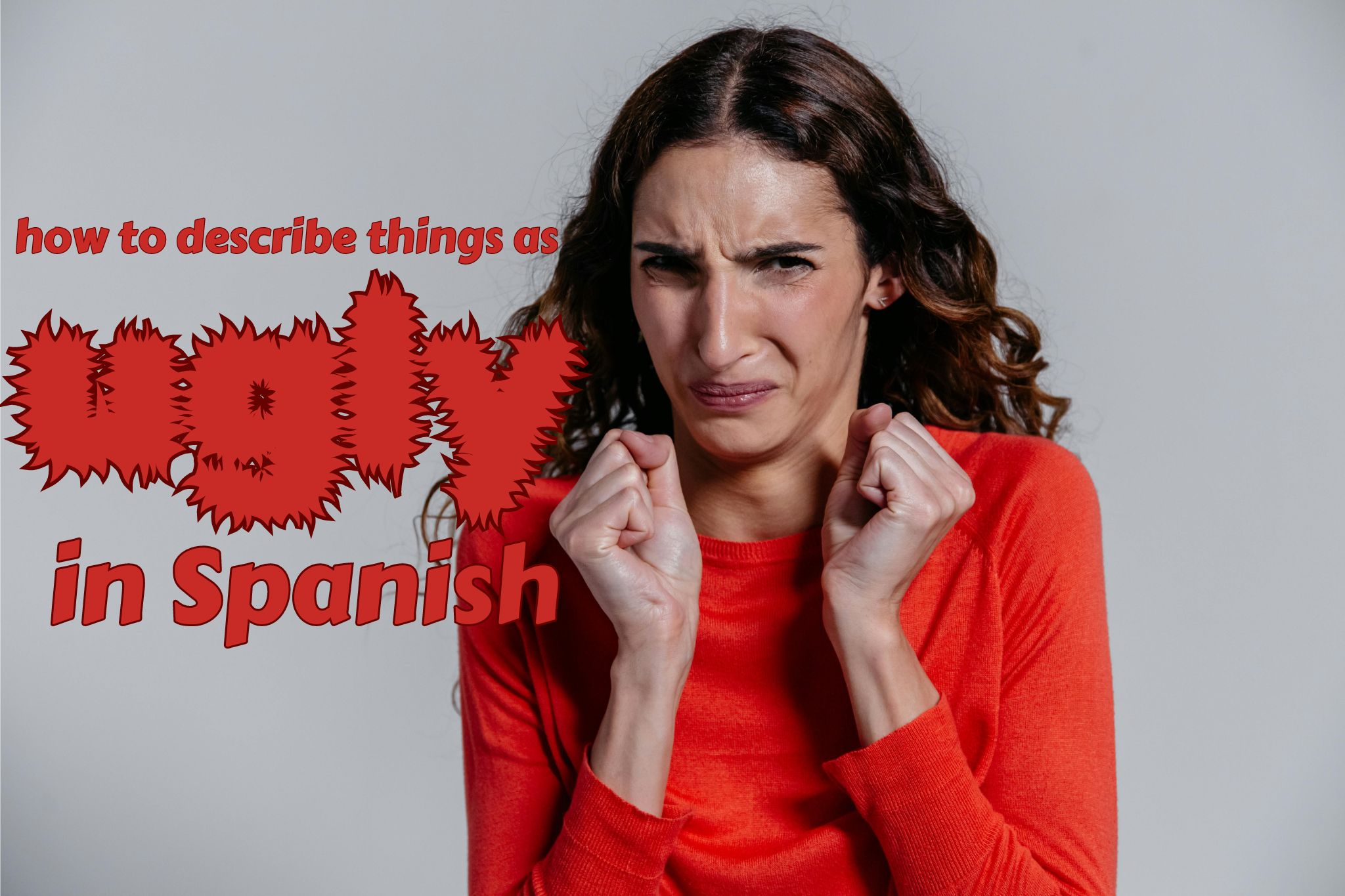Ugly in Spanish: 12 options beyond Feo

Get our free email course, Shortcut to Conversational.
Have conversations faster, understand people when they speak fast, and other tested tips to learn faster.
More infoThere’s no denying it: sometimes things are just ugly. And since language is all about telling it like it is, how do you say ugly in Spanish?
In fact, we have plenty of nuanced options to convey varying degrees of unpleasantness or repulsiveness. Even when we’re not talking about physical appearance, we still often describe things as ugly in Spanish.
So let’s learn over a dozen different ways to articulate ugliness in Spanish, shedding light on the context and usage of each term.
How to use Ugly in Spanish
In Spanish, ugliness encompasses a broad spectrum of things, ranging from physical appearance to abstract concepts. We can use different words that mean ugly in Spanish to describe objects, people, behaviors, situations, feelings, or ideas. In many such contexts in English, you’d probably rather just use the catch-all term bad.
For the most part, we use adjectives to express that something is ugly. This means that we need to follow the standard rules for adjectives in Spanish, namely that they need to agree in gender and number with the noun they describe. Some adjectives are neutral, so the same form is used for both genders. In addition, sometimes the same words can be used as adverbs to modify a verb or another adjective, in which case we always use the basic masculine form.
We’ll include the masculine and feminine forms of the adjectives we introduce here. Just remember to make them plural when needed, too! Don’t worry, we’ll show all four forms in our example sentences. Now let’s get into our Spanish ugly words!
Feo, Fea – Ugly
The most common and versatile term for ugly in Spanish is feo.
- El dibujo de mi hermano es feo. – My brother’s drawing is ugly.
- Esa cortina es muy fea. – That curtain is very ugly.
- ¡Qué feos modales tienes! ¡Aprende a comportarte! – What bad manners you have! Learn to behave yourself!
- Las flores están feas, se ven marchitas. – The flowers are ugly, they look wilted.
- Este perfume huele muy feo. – This perfume smells very bad.
Feúcho, Feúcha – Ugly
Feúcho refers to something that is not quite good-looking, without being outright ugly. It serves to delicately mitigate the potentially harsh connotations that come with the use of feo in Spanish.
- Su letra es feúcha, pero es una chica muy inteligente. – Her handwriting is kind of ugly, but she’s a very smart girl.
- Ya sé que mi carro es viejo y feúcho, no tienes que decirlo. – I know my car is old and ugly, you don’t have to say it.
- Las zarigüeyas son feúchas, pero inofensivas. – Opossums are kind of ugly, but harmless.
- Esos cuadros están feúchos, Marta. Deberías redecorar. – Those pictures aren’t so great, Marta. You should redecorate.
Horrible – Horrible, Hideous, Awful
Similar to its English counterpart, horrible in Spanish denotes something extremely unpleasant or repulsive. It’s often used to emphasize the severity of ugliness, whether it’s in reference to an object, a person’s behavior, or a situation. Even though it’s spelled like the English version, remember to distinctly pronounce the final -e in Spanish.
- Me parece horrible que seas grosero con los meseros. – I find it horrible that you are rude to waiters.
- Esa falda es horrible, no te queda para nada. – That skirt is hideous, it doesn’t suit you at all.
- Mi cabello está horrible hoy. – My hair looks awful today.
- Esta sopa sabe horrible, tiene demasiada cebolla. – This soup tastes awful, there’s too much onion in it.
Horroroso, Horrorosa – Horrific, Terrible, Hideous
This word sits at a higher degree of the Spanish ugly spectrum, conveying an extreme sense of ugliness. With its alliteration, it’s also just a fun word to say when you’re dramatically describing something as being hideous!
- Escuché un rumor horroroso y espero que no sea cierto. – I heard a terrible rumor and I hope it’s not true.
- No sé por qué escuchas esa música tan horrorosa. – I don’t know why you listen to such horrible music.
- Las chicas compraron unos floreros horrorosos. – The girls bought some hideous vases.
- Esos pobres animales viven en condiciones horrorosas. Es realmente triste. – Those poor animals live in horrible conditions. It’s really sad.
- El arenero del gato huele horroroso. Hay que limpiarlo. – The cat’s litter box smells terrible. It needs to be cleaned.
Horrendo, Horrenda – Horrific, Terrible, Hideous
Similar to our previous word, horrendo describes something extremely unpleasant or horrific.
- Ese color es horrendo, no lo usaré jamás. – That color is hideous, I will never wear it.
- No puedo ni verte con ese peinado horrendo. – I can’t even see you with that hideous hair-do.
- Los insectos son horrendos, los detesto. – Insects are hideous, I hate them.
- Dijiste cosas horrendas sobre mí el otro día, y me dolió mucho. – You said horrible things about me the other day, and it really hurt me.
Espantoso, Espantosa – Appalling, Dreadful, Hideous
Espantoso translates to appalling or horrifying in English. It describes something that is extremely shocking, dreadful, or terrifying in appearance or nature.
- Tienes un aspecto espantoso, ¿estás enfermo? – You look terrible, are you sick?
- Trae puesta la camiseta hawaiana más espantosa. – You’re wearing the most hideous Hawaiian shirt.
- Han sido unos días espantosos, no tienes ni idea. – It’s been an awful few days, you have no idea.
- Sus espantosas acciones trajeron espantosas consecuencias. – His dreadful actions brought dreadful consequences.
Asqueroso, Asquerosa – Disgusting, Gross
When something is not only ugly but also disgusting or revolting, asqueroso is the right term. This word conveys a strong sense of repulsion, indicating that the ugliness goes beyond mere aesthetics to evoke feelings of nausea or abhorrence.
- No quiero ser mala, pero ese plato se ve asqueroso. – I don’t want to be mean, but that dish looks disgusting.
- Su forma de ser es asquerosa, no me gusta hablar con él para nada. – His way of being is disgusting, I don’t like talking to him at all.
- Los gusanos son demasiado asquerosos. – Worms are too gross.
- No digas cosas asquerosas cuando estamos comiendo. – Don’t say gross things when we’re eating.
Repugnante, Repulsivo – Repulsive, Disgusting
Repugnante carries a similar meaning to asqueroso, denoting something repulsive or abhorrent.
- Su personaje me pareció repugnante. – I found her character repulsive.
- Esa chica es tan mala que es repulsiva. – That girl is so evil that she’s repulsive.
- Esa fruta tiene un olor repugnante. – That fruit has a disgusting smell.
- Las cucarachas me parecen repugnantes. – I find cockroaches disgusting.
Deforme – Deformed
This word describes something that is physically misshapen or malformed. Deforme doesn’t change form between masculine and feminine, but it’s still necessary to add an -s in plural.
- Tu dibujo quedó deforme, el mío quedó bonito. – Your drawing turned out deformed, mine turned out beautiful.
- Dicen que el chupacabras es una bestia aterradora y deforme. – They say that the chupacabras is a terrifying and deformed beast.
- Mi gato tiene la cara un poco deforme. – My cat has a slightly deformed face.
- Las esculturas que tiene la abuela en su sala son deformes. – The sculptures that Grandma has in her living room are deformed.
Desagradable – Unpleasant
In situations where the ugliness is more about being unpleasant or disagreeable than outright repulsive, desagradable is the appropriate term. It implies a lack of attractiveness or charm. Desagradable is another invariable adjective which doesn’t change form between masculine and feminine.
- Creo que Manuel no se dio cuenta, pero hizo un escándalo muy desagradable. – I don’t think Manuel noticed, but he made a very unpleasant fuss.
- La textura de esta pizarra es muy desagradable. – The texture of this slate is very unpleasant.
- No quiero andar escuchando tus comentarios desagradables. – I don’t want to listen to your unpleasant comments.
- No sé por qué te juntas con muchachas tan desagradables. – I don’t know why you hang out with such disagreeable girls.
Grotesco, Grotesca – Grotesque
When ugliness veers into the realm of the grotesque or absurd, grotesco is the word to use. It describes something distorted or exaggerated in a disturbing or unsettling manner.
- ¡¿Qué pasó en la cocina?! ¡Hay un desastre grotesco! – What happened in the kitchen, there’s a grotesque mess!
- Eduardo dibujó una cara grotesca en la pared. – Eduardo drew a grotesque face on the wall.
- No me gustan sus diseños, son muy grotescos. – I don’t like his designs, they’re too grotesque.
- No me gustan sus uñas, se ven grotescas. – I don’t like her nails, they look grotesque.
Corriente, Vulgar – Crude, Unrefined
We’re introducing these two words together because they both have the same meaning in Spanish, which is less intense than vulgar in English. Corriente can also translate as current, but when used as an adjective to describe something, some better equivalents in English are just commonplace, regular, or unrefined. Likewise, try to associate the Spanish word vulgar with crude, in the sense that it’s used to describe something that lacks refinement.
Corriente and vulgar in Spanish are good alternatives to calling something outright ugly in Spanish, with the nuance that it’s just aesthetically unappealing. It rather suggests tackiness or cheapness. Both are invariable adjectives.
- Ese cinturón es muy vulgar, no sé cómo puedes usarlo. – There’s nothing special about that belt at all, I don’t know how you can wear it.
- No me gusta para nada la actitud corriente de ese chico. – I don’t like that boy’s crude attitude at all.
- Qué vestidos tan vulgares, no tienen nada de clase. – Such tacky dresses, they have no class at all.
- ¿Por qué dices esas palabras tan corrientes? – Why do you say such unrefined words?
De mal gusto – In bad taste, Tasteless
De mal gusto is used to describe something that’s inappropriate due to a lack of taste or discernment. It often refers to jokes, comments, actions, or other forms of expression that are seen as disrespectful, vulgar, or socially unacceptable. It can also be used to describe something that’s just not aesthetically pleasing. The direct translation is in bad taste, but a better equivalent in English is often just tasteless.
- Hizo un chiste de mal gusto y nadie se rió. – He made a joke in bad taste and no one laughed.
- La decoración es de mal gusto y los muebles son incómodos. – The decor is tasteless and the furniture is uncomfortable.
Conclusion: Ugly in Spanish
Are you ready to walk up to someone and tell them you are ugly in Spanish? Just kidding, it’s better to be nice and tell them they are beautiful instead! Before we finish with this ugly matter, let’s do a quick recap.
Today we learned the diverse words and phrases that allow us to articulate varying degrees of ugliness, whether it’s in physical appearance, behavior, or even abstract concepts. From feo to repugnante, each of these ways to say ugly in Spanish adds depth and precision to our expressions.
So the answer to our question above is that yes, now you can indeed tell someone they’re ugly in Spanish, but with all the nuances about what exactly you find displeasing and to what degree! Or, of course, you can just use these different Spanish ugly terms to express your opinions on anything from art to style to speech.



